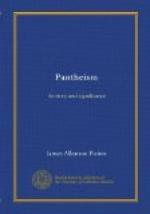[Sidenote: Why Pantheism as a Religion was called Modern.]
In the earlier part of this essay I made the remark that Pantheism as a religion is almost entirely modern. The context, however, clearly showed what was meant; for several pages have been occupied with indications of the ideas and teaching of individual Pantheists from Xenophanes to Spinoza. But we do not usually take much note of a religion that is confined to one or two men in an age. If it dies out we treat it merely as a curiosity, or an intellectual puzzle, like the dreams of Jacob Boehme, or the atheistic ecclesiasticism of Comte. But, if it afterwards shows symptoms of unexpected adaptation to the mental and moral conditions of a newer world, and if, on account of this adaptation, it gains a hold on men who are neither philosophers nor metaphysicians, but only religious, it demands our consideration on far other grounds than those of intellectual curiosity.
[Sidenote: Pantheistic Tendencies of Contemporary Thought]
Now it has only been during the second half of the last century that Pantheism has been able to claim attention as a religion in such a sense as this. As to the fact there can hardly be any dispute. For not only has it become ever a more prominent motive in the music of the poets, and not only are all rationalizations of Christianity more or less transparent disguises of Pantheism, but I may safely appeal to those ordinary members of intelligent society who are neither poets, nor divines, nor philosophers, whether the freest and most confidential interchange of religious thought does not continually verge on a faith which merges everything in God.
[Sidenote: Caused by the Mutual Pressure of Science and Faith.]
[Sidenote: The Nebular Hypothesis taken alone Involves Absurdity.]
Nor are the reasons of this tendency far to seek. Indeed, they are palpable and conspicuous in the mutual pressure of science and faith. For, on the one hand science has made unthinkable the old-world conception of a three-storeyed Universe, constructed by an artificer God, who suddenly awoke from an eternity of idleness to make Heaven, Earth, and Hell—a conception involving a King of kings, enthroned like an eastern monarch, and sending forth His ministering spirits, or appointing His angel deputies to direct and govern at His beck. Or if it be said that never, except in the ages of primeval simplicity, or amongst later generations living under primeval conditions? has such a conception been entertained, it would be difficult for the “broadest” Churchman to say what has been, put in its place. It is vain to remind us how later Christianity has patronised nebular hypotheses and the doctrine of evolution. For these give no definite substitute whatever for the old story, that Elohim “spoke, and it was done—he commanded, and it stood fast.” Whence the fiery mists by the rotation and cooling of which the worlds were slowly evolved? We are told that the




